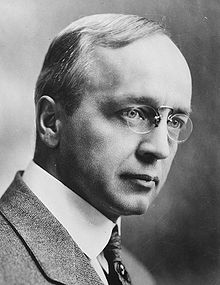Edwin W. Kemmerer
| Edwin Walter Kemmerer | |
|---|---|
 |
|
| Born |
June 29, 1875 Scranton, Pennsylvania |
| Died | December 16, 1945 (aged 70) Princeton, New Jersey |
| Nationality | American |
| Influences | Jeremiah Jenks |
Edwin Walter Kemmerer (June 29, 1875 – December 16, 1945) American economist, became famous as an economic adviser to foreign governments in many countries (Philippines, Mexico, Guatemala, Colombia, Germany, Chile, South Africa, Poland, Ecuador, Bolivia, China, Peru, and Turkey), promoting plans based on strong currencies, the gold standard, central banks, and balanced budgets. "He helped design the U.S. Federal Reserve System in 1911, edited the American Economic Bulletin and the American Economic Review, and became president of the American Economic Association in 1926."
He graduated with honors and a Phi Beta Kappa key from Wesleyan University, and earned his Ph.D. from Cornell University, where he taught (1906-1912). At 28, was appointed Financial Adviser to the U.S. Philippine Commission. In 1912 he became a professor at Princeton University, where he was made the first director of its new International Finance Section; by then Kemmerer had a well established reputation as an international "money doctor."
All of the plans created by economic advisors like Kemmerer were aimed "towards the establishment of an internationally interconnected monetary and credit system based on stable national currencies in fixed value relationship with gold and other gold currencies." Consequently, the plans required among other things, central bank independence, the payment of all debts and balanced state budgets.
R. Nötel, in his essay on the International Credit and Finance of Eastern Europe, complains that the advice of these "money doctors" was "sometimes discordant", adding that their plans were written not only to have the debtors comply with the rules of the international financial system, but also to obtain the approval of much needed loans.
As a "money doctor" Kemmerer was not alone: in Poland he was followed by Charles Dewey; Romania had the Frenchmen Charles Rist and Roger Auboin; and for Hungary and Germany, the Americans Jeremiah Smith Jr and S. Parker Gilbert, respectively.
...
Wikipedia
